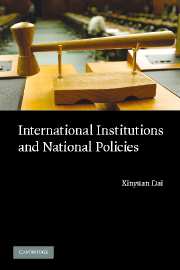Book contents
- Frontmatter
- Contents
- List of tables
- Acknowledgments
- 1 Introduction
- 2 The study of international institutions
- 3 Monitoring arrangements
- 4 Compliance mechanisms
- 5 The power of weak international institutions
- 6 Conclusion
- Appendix A Formal solutions
- Appendix B Ranking of signatory countries in LRTAP
- Bibliography
- Index
5 - The power of weak international institutions
Published online by Cambridge University Press: 22 September 2009
- Frontmatter
- Contents
- List of tables
- Acknowledgments
- 1 Introduction
- 2 The study of international institutions
- 3 Monitoring arrangements
- 4 Compliance mechanisms
- 5 The power of weak international institutions
- 6 Conclusion
- Appendix A Formal solutions
- Appendix B Ranking of signatory countries in LRTAP
- Bibliography
- Index
Summary
In chapter 4, I developed the domestic compliance mechanism and provided evidence that compliance reflects the electoral leverage and informational status of competing domestic constituencies. This finding, however, raises an important question: if compliance is a function of domestic constituencies, what is the role of international institutions? In particular, how do weak international institutions, limited in both monitoring and enforcement, influence states' behavior? In this chapter, I investigate how international institutions play into the domestic game of enforcement to influence a state's compliance with international agreements.
As reviewed in chapter 2, questions concerning the effects of international institutions on sovereign behavior are central to the study of international relations. Early theories, particularly rationalist institutional theories, have focused primarily on the functions that international institutions perform directly for states (Martin and Simmons 1998). While the state-centric framework has been important for sorting out broad ways in which international institutions may alter patterns of interaction between states, it has neglected a range of indirect pathways through which international institutions may influence national policies (Haggard and Simmons 1987). As a consequence, we do not fully understand how weak international institutions – the majority of international institutions that lack the authority to directly enforce states' compliance or the resources to directly enhance states' capacity to comply – may influence states' behavior.
Scholars have responded to such a deficiency in several ways. First, some argue that weak international institutions such as nonbinding accords or binding treaties that lack enforcement provisions are inconsequential.
- Type
- Chapter
- Information
- International Institutions and National Policies , pp. 100 - 139Publisher: Cambridge University PressPrint publication year: 2007



